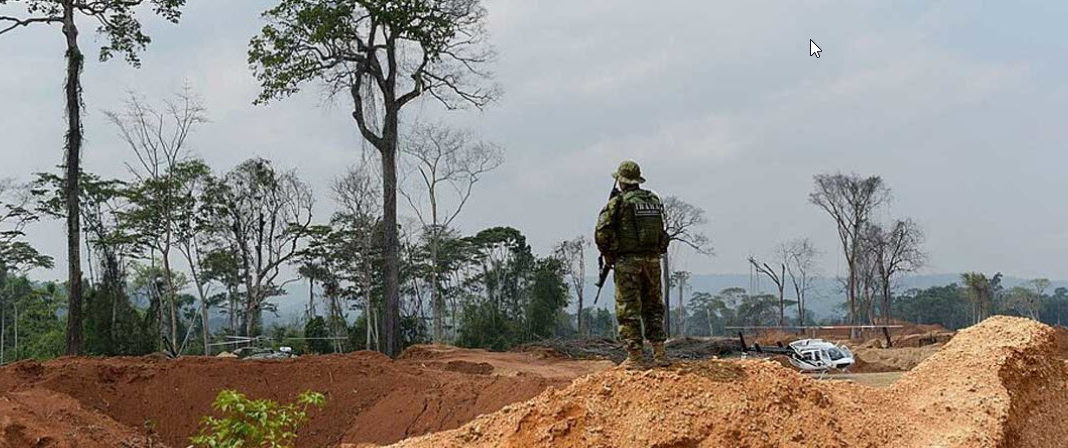- While the media focused in 2019 on Brazilian President Jair Bolsonaro’s incendiary remarks, or on the Amazon fires, he has quietly instituted new policies likely to aid land grabbers and do great harm to Amazon forests, indigenous and traditional peoples. “Death by 1,000 Cuts” parts 1 and 2 reviews those policies.
- Executive decree MP 910 issued December 11 legalizes large-scale land grabbing. The large-owner loophole built into the new decree allows land speculators to register large swathes of public lands that they grabbed before December 2018, using the illegal deforestation they accomplished as proof of their “occupation.”
- MP 910 could transfer 40-60 million hectares of public land to private owners who would then be authorized to legally deforest a fifth of that land, about 10 million hectares, experts say. MP 910 is likely to trigger high rates of conflict and deforestation. Congress must approve MP 910 in 120 days to make it permanent.
- The agriculture ministry also chose to make secret part of its ranching database, thwarting Visipec, an NGO-designed tool for tracking cattle raised on calving ranches where major deforestation occurs. Other administrative measures benefit big agribusiness over small family farms, and muzzle civil society voices.
- This article was first published on Mongabay on 30 December 2019. You can read the original here.
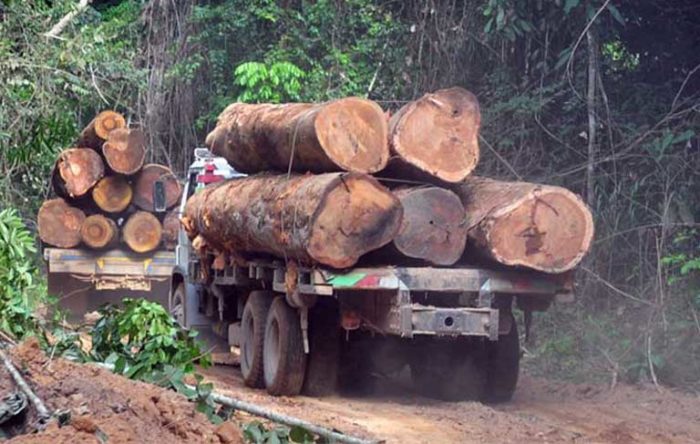
Brazilian President Jair Bolsonaro is a man of incendiary words and big gestures. As such, he has attracted the attention of global media who cover his major outbursts and policy initiatives, as he pledges to open indigenous reserves to mining and agribusiness, and as he dismantles environmental and social agencies, firing those who oppose him.
But over recent months Bolsonaro has quietly announced a flurry of measures that, while flying under the media radar, are making it easy for land grabbers to acquire large tracts of land in Amazonia — paving the way for the elite owners of garimpos (artisanal mines), and transnational mining companies to move into indigenous reserves and other protected areas.
At the same time, the government has brought all agrarian reform to a standstill and halted altogether the previously snail-slow process of demarcating land occupied by indigenous and traditional populations — boundary marking guaranteed under the 1988 Constitution.
These administrative changes, announced piecemeal, add up to a major shake-up regarding land tenure, and result in a drastic tipping of the never-level playing field, benefiting the wealthy and powerful. This restructuring is also emerging as potentially the most substantial anti-environmental policy shift since the military dictatorship, which ended in 1985 — making it the biggest threat to the Brazilian Amazon and its people.
This is the first of two articles in which Mongabay surveys these measures representing a death by 1,000 cuts. This first piece concentrates mainly on the benefits to land speculators, while the second will largely cover mining.
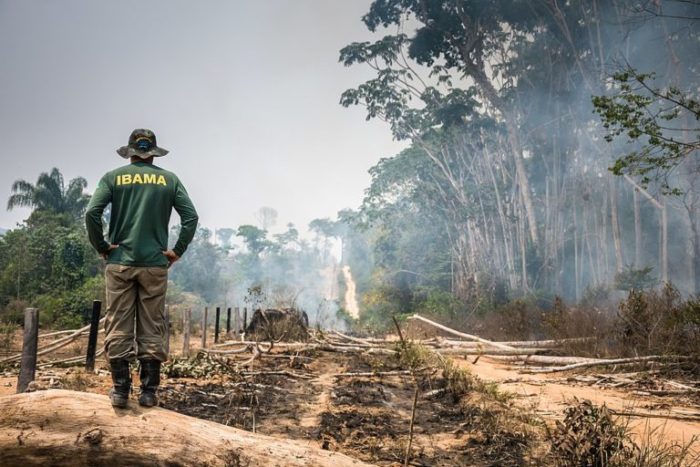
MP 910: Legalized land grabbing
After months of rumor that a major land tenure measure was imminent, Bolsonaro finally issued executive decree MP 910 on December 11.
The decree, which Bolsonaro pledges will end land chaos, especially in the Amazon, is cloaked in a promise to benefit the thousands of peasant families who have long occupied public land, some arriving in the 1970s with the encouragement of the military government. Finally, they will find it easy to register their small plots, Bolsonaro said, which means they’ll be able to obtain bank loans so as to increase agricultural production.
The executive measure is already in force, but under Brazilian law must be approved by Congress within 120 days or cease to be valid. With the bancada ruralista agribusiness lobby dominant in the legislature, passage of MP 910 seems almost certain.
The government estimates that the measure will lead to the registration of some 300,000 properties, 86% of them in Amazonia by the National Institute of Agrarian Reform and Colonization (INCRA).
However, there’s more here than meets the eye, say analysts. Even though many small landholders may be beneficiaries, a closer look at the decree reveals a hidden agenda. Those smallholders, while large in number, only occupy a small portion of total claimed land. The real winners will be large-scale farmers, including many elite wealthy land grabbers. Although these ruralists make up only a small minority of beneficiaries, they’ll become legal owners of the largest amount of land by far.
The large-owner loophole built into the new decree is, according to experts, an open invitation for land speculators to register large swathes of public lands that they illegally grabbed before December 2018. Building on land tenure decrees issued first by President Lula in 2009 and then by President Temer in 2017, MP 910 permits land grabbers to seize land, deforest it and then register it as theirs.
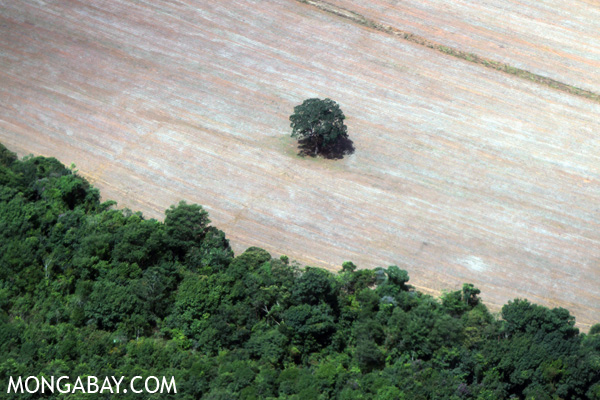
At the heart of the loophole: a term known as “self-declaration.” Before the decree was published, Luiz Antônio Nabham Garcia, a leading ruralist and the powerful federal Secretary of Land Affairs, noted that the new land rule would be based on “self-declaration” or autodeclaração, a process that allows would-be landowners, based only on their say-so, to declare the size of their properties, without need for independent verification on the ground.
The only way the government will check these claims is through satellite imaging, accepting as “proof of occupation” deforestation carried out before December 2018 — deforestation on public land which was completely illegal at the time. Put simply, MP 910 legitimizes the theft of public lands by asking land grabbers for proof of an illegal act they committed in the past as grounds for the legalization of a land claim today.
Even before MP 910 was issued, “self-declaration” was extremely controversial. In October, Bolsonaro sacked INCRA head General João Carlos Jesus Corrêa, because he had become “a thorn in the side” of Nabham over the issue. Successor, Geraldo Melo Filho, is aligned with the ruralists.
Corrêa wasn’t alone. The Federal Audit Court (TCU), a powerful government body that monitors the federal government’s accounts, expressed disquiet that the expedited procedure would invite abuse. The government responded by keeping the policy intact but banning the use of the term “autodeclaração.”
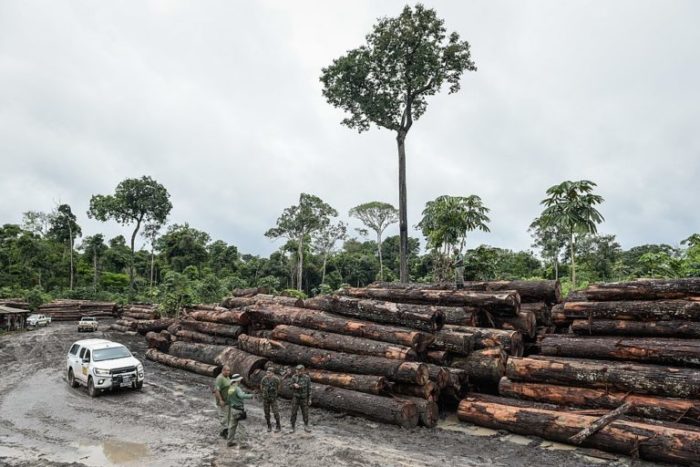
Environmentalists sound the alarm
Raul Valle, Director of Socioenvironmental Justice at WWF-Brasil, says that the measure will not only reward land grabbers for past actions, but encourages further land grabbing, as it creates the expectation that it will be easy to register land stolen today. “It rewards the strongest, as they get the land title,” he said.
According to some analysts, the decree will probably lead to the handing over of between 40-60 million hectares (145,000-232,000 square miles) of public land to private landowners. These new owners will then be authorized to legally deforest a fifth of that land, about 10 million hectares (39,000 square miles), though part of this area may already be cleared. The figure will probably be much higher, if illegal deforestation is included. MP 910 is likely to trigger extremely high rates of violence and deforestation, equivalent, critics say, to that caused by Amazon highway construction by Brazil’s military government in the 1970s.
Writing in El País, the journalist, Eliane Brum, expects that land speculators will use force to seize land occupied by peasant families that land thieves covet. In fact, this is already happening, she says. In Anapu, the town in Pará state where American nun, Dorothy Stang, was murdered in 2005, two rural leaders were killed this month. Lax law enforcement in the Amazon under Bolsonaro is likely to exacerbate conflict, as will the president’s incendiary remarks critical of indigenous groups and traditional communities that critics say emboldens ruralists to commit violence.
Brum warns: “If congress doesn’t stop this decree, Amazonia will become a forest of corpses. Not of trees, but of people.”
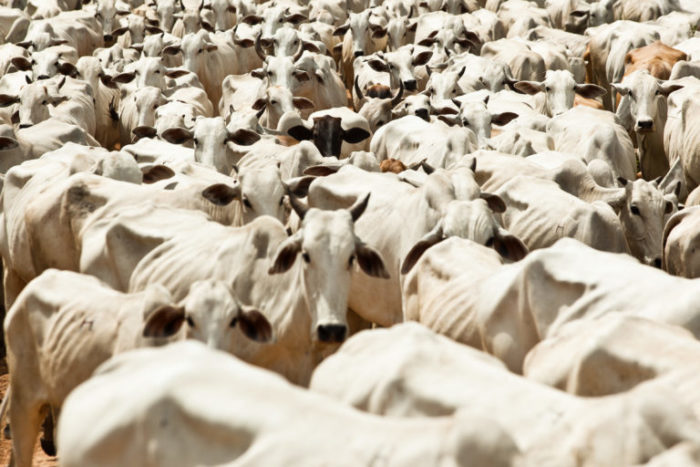
Promoting agribusiness
Besides legitimizing large-scale land grabbing, the Bolsonaro government has taken other measures to encourage the expansion of agribusiness in the Amazon.
It has revoked a decree that forbade the expansion of sugarcane into sensitive areas, like the Pantanal wetlands and Amazonia — a policy that environmentalists fear will drive deforestation.
In another discreet move, the agriculture ministry decided that part of its database will no longer be publicly available because it contains “personal information” that “does not interest the general public.” This seemingly innocuous move will have significant consequences, preventing the tracking of cattle from calving ranches (where major deforestation occurs) to cattle laundering farms (where no tree loss occurs), before the adult animals are sold to slaughterhouses.
The newly announced database secrecy will thwart Visipec, a recently developed system to track the movement of cattle from origin to meat processing plant, created by University of Wisconsin researchers working in cooperation with the National Wildlife Federation.
Though the tracking tool has the potential to reduce deforestation from the meat supply chain and the National Wildlife Federation has offered Visipec free to meatpackers, none, including the biggest, JBS, has accepted the offer. Now that Bolsonaro has shut down public access to cattle data, Visipec won’t work.
As The New York Times pointed out, the tracking tool would have closed “what some experts suggest has been a convenient loophole for all parties in the Brazilian cattle industry.” Keeping the cattle deforestation loophole wide open makes life easier for meatpackers while foiling environmentalists.
In another move, the government has made it harder to impose fines on buyers of illegal timber. Until Eduardo Bim, the president of IBAMA, altered regulations in November, buyers could be fined by IBAMA, Brazil’s environmental agency, if they bought timber illegally extracted from protected areas and indigenous units.
Now fines can only be charged if IBAMA can prove intent, that the buyers knew that the documents claiming to show that the timber was legally felled were fraudulent. According to Márcio Astrini, from Greenpeace, the new norm creates “a kind of second-scale impunity in the commercial chain,” — intent is a very difficult legal claim to prove.
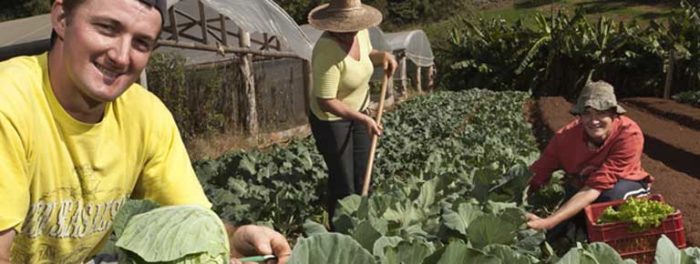
Reducing support for small producers
The government, while facilitating agribusiness, is also ending some of the long-standing programs that supported small family farms — important providers of staple foods to Brazilians.
One key policy shift alters a long-established government program mandating that small farms be prioritized in the sale of food to municipal and state governments for the free lunch programs through which thousands of Brazilian public schools feed their pupils.
Selling food to schools has been an important source of family farm income since 2009 when the Lula government decided that at least 30% of resources used by the National Fund for the Development of Education (FNDE) to fund school meals be used to purchase food directly from family farmers. The government made it clear then that it wanted to give “priority to agrarian reform settlements, indigenous communities and quilombolas,” communities made up of runaway slave descendants.
Now, a bill in Congress, proposed by ultra-conservative senator Izalci Lucas (under investigation for financial fraud), would leave it to municipal and state governments to set the percentage of food purchased from family farms. Given that many of these governments are ruralist-controlled, it seems likely they would increase purchases from big, commercial farms, while cutting off small producers in agrarian reform settlements, indigenous communities and quilombolas.
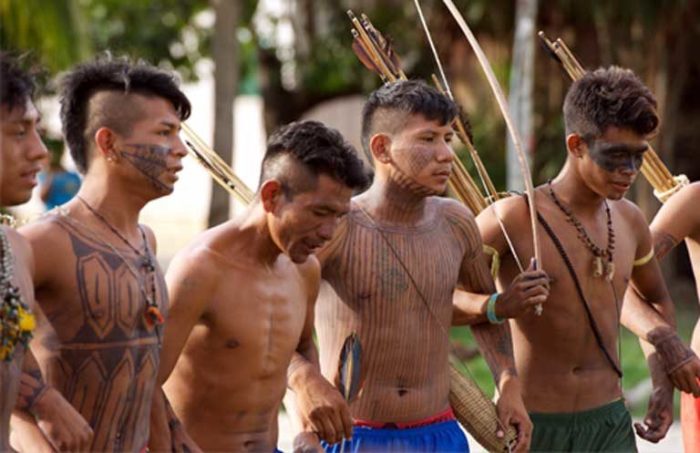
Muting civil society voices
Even as it boosts land grabber rights and agribusiness opportunities, the Bolsonaro government is silencing civil society representatives who formerly provided a voice for those most likely to be harmed by Amazon deforestation and development. In particular, the administration has restructured government entities charged with combating deforestation and reducing Brazil’s climate change impacts.
In April 2019, Bolosonaro closed down hundreds of government boards and bodies that included members of both civil society and government. In so doing, it assured that Brazil would arrive at the United Nations climate summit in December (COP25) with no delegates representing Brazilian environmental organizations — making it unlikely anyone would embarrass Bolsonaro by raising objections to Brazil’s rising deforestation rates and its abandonment of its commitment to meet its Paris Climate Agreement carbon cut pledges.
At the end of November, just three days before COP25 began, the government announced five decrees recreating some of the abolished public organs. But the bodies’ composition has been changed by Environment Minister Ricardo Salles: they are smaller and without representatives of civil society, or with too few to influence public policy.
One example: the Protected Areas of Amazonia Program (ARPA), considered the most ambitious program in the world for the preservation of tropical forests. The membership of its administrative council has been cut from 12 to seven members. The Environment Ministry, which used to have two members, now has none. Civil society, which once had two members, now has one, and private donors, once with three seats, now have only one.
In similar fashion the government changed the composition of the Consultative Council of the National Fund for Forest Development (FNDF). Until mid-October 2019, FNDP had 14 members, three each from social movements, environmental organizations and traditional communities. Now the number of members has been reduced to seven, with all of those groups losing their members. FNDP promotes technological innovation and encourages collaborations with industry relating to forests.
The government’s dismissive attitude toward international concern over Brazil’s rapidly rising deforestation rate and contribution to the climate crisis was perhaps best reflected in a Twitter post by Environment Minister Salles in Madrid as December’s COP25 was ending. “To compensate for our emissions at COP, a veggie meal,” he wrote, accompanying his words with a photo of a gigantic plate piled high with barbecued beef. Whatever else may be said, the Bolsonaro administration has made it clear who it supports, and who it doesn’t.
Banner image caption: Under MP 910, illegally deforested public land, like that seen here inside the Kayapó indigenous territory in Pará state, can be legitimately claimed by the land grabber who cut down the trees, using the illegal deforestation as proof of “occupation.”

